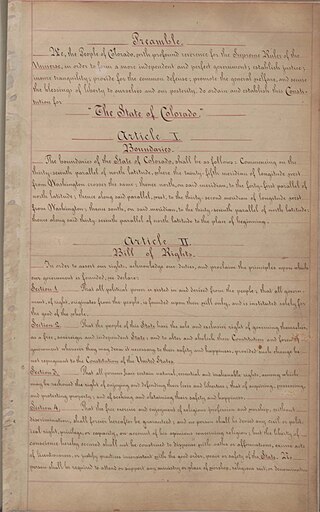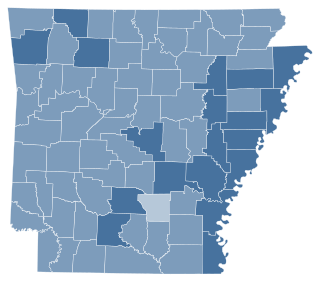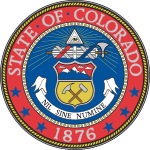
Prior to the Supreme Court's decision in Obergefell v. Hodges (2015), U.S. state constitutional amendments banning same-sex unions of several different types passed, banning legal recognition of same-sex unions in U.S. state constitutions, referred to by proponents as "defense of marriage amendments" or "marriage protection amendments." These state amendments are different from the proposed Federal Marriage Amendment, which would ban same-sex marriage in every U.S. state, and Section 2 of the Defense of Marriage Act, more commonly known as DOMA, which allowed the states not to recognize same-sex marriages from other states. The amendments define marriage as a union between one man and one woman and prevent civil unions or same-sex marriages from being legalized, though some of the amendments bar only the latter. The Obergefell decision in June 2015 invalidated these state constitutional amendments insofar as they prevented same-sex couples from marrying, even though the actual text of these amendments remain written into the state constitutions.

Amendment 44 was a proposed amendment to the state statutes submitted for referendum in the 2006 general elections in the U.S. state of Colorado. The amendment proposed the legalization of the possession of one ounce or less of marijuana for any person twenty-one years of age and over, as long as marijuana use does not occur in public. The measure was eventually defeated at the polls by 59-41 percent.

Amendment 41 was a citizen initiative adopted by Colorado voters in the 2006 general election. The amendment was approved by 62.6% of voters. Amendment 41 has three main sections.

2006 Colorado Referendum J was a failed ballot measure to implement stricter spening requirements for public school district budgets in Colorado.

The Constitution of the State of Colorado is the foundation of the laws and government of the U.S. state of Colorado. The Colorado State Constitution was drafted on March 14, 1876; approved by Colorado voters on July 1, 1876; and took effect upon the statehood of Colorado on August 1, 1876. As of 2020, the constitution has been amended at least 166 times. The Constitution of Colorado derives its authority from the sovereignty of the people. As such, the people of Colorado reserved specific powers in governing Colorado directly; in addition to providing for voting for Governor, state legislators, and judges, the people of Colorado have reserved initiative of laws and referendum of laws enacted by the legislature to themselves, provided for recall of office holders, and limit tax increases beyond set amounts without explicit voter approval, and must explicitly approve any change to the constitution, often with a 55% majority. The Colorado state constitution is one of the longest in the United States.

Electoral reform in Colorado refers to efforts to change the voting laws in the Centennial State.
Ballot Measure 25 of 2002 increased Oregon's minimum wage from $6.50 to $6.90 per hour and required an annual increase to compensate for inflation in future years. Inflation is measured by the consumer price index. As of 2015, the minimum wage in Oregon is $9.25 an hour. The measure was approved in the November 5, 2002 general election with 645,016 votes in favor, 611,658 votes against.Itemized Measure Listings, Measure 25 page 17 The measure was placed on the ballot as a result of initiative petition.

Maine Question 4, formally An Act to Raise the Minimum Wage, is a citizen-initiated referendum question that appeared on the Maine November 8, 2016 statewide ballot. It sought to increase Maine's minimum wage from $7.50 per hour to $12 an hour by 2020, as well as increasing the minimum wage for tipped employees gradually to the same level by 2024. It would also index increases after 2024 to inflation. As the Maine Legislature and Governor Paul LePage declined to enact the proposal as written, it appeared on the ballot along with elections for President of the United States, Maine's two U.S. House seats, the Legislature, other statewide ballot questions, and various local elections. Efforts to place a competing, more moderate proposal alongside the citizen-initiated bill were unsuccessful.

Five referendums were held in Maine, United States on November 8, 2016 alongside state and national elections. All are citizen-initiated proposals, which cover:
Three ballot measures were certified for the November 6, 2018, general election in the state of Massachusetts.

The Fairness Project is a United States 501(c)(4) charitable organization created in October 2015. They promote general economic and social justice throughout the US by the use of ballot measures to circumvent deadlocks in law changes by the legislative and executive branches of government. They act as a national body by supporting state organizations and campaigns with targeted funding rather than by direct campaigning. They support the gathering of signatures to meet the variable requirements to trigger ballots in states and then aid the campaigns with early financial backing, strategic advice, and various campaign tools.

Initiative 77 was a voter-approved ballot initiative in Washington, D.C., to phase out the special minimum wage for tipped employees as part of the national Fight for $15 campaign. In the June 2018 primary election, D.C. voters approved Initiative 77 by a margin of 56% to 44%; however, the D.C. Council repealed the initiative in October before it could enter into force. In 2022, a nearly identical Initiative 82 was approved for the November 8, 2022 election.

2018 Idaho Proposition 2 is an approved ballot initiative that was included on the 2018 General Election ballot on November 6, 2018. Idaho's Proposition 2 is an initiative which addressed the proposed Medicaid gap within the state. This Ballot Initiative was approved and qualified to be included for voting on July 17, 2018, through campaigning and petitioning for signatures to acquire the necessary support of the voting Idaho population to be included for state-wide voting through the 2018 General Election ballot. This initiative moved to expand Medicaid to persons who did not previously qualify. Proposition 2 would expand Medicaid coverage to persons under the age of 65 if their income is below 133% of the Federal Poverty Line (FPL) and are unable to gain medical insurance or coverage through other means.

Colorado Amendment A was a 2018 referendum to amend Article II, Section 26 of the Constitution of Colorado to remove language permitting slavery and involuntary servitude only as punishment for crime.

Colorado state elections in 2020 were held on Tuesday, November 3, 2020. The deadline to register and receive a ballot by mail in Colorado was October 26, 2020. Voters may register in person and vote or pick up a ballot at Voter Service Centers October 19 through 7 p.m. November 3, 2020. Colorado exclusively used a vote-by-mail system, although voters may choose to vote in person at Voter Service and Polling Centers (VSPCs).

Florida state elections in 2020 were held on Tuesday, November 3, 2020. Aside from its presidential primaries held on March 17, its primary elections were held on August 18, 2020.

2018 Arkansas Question 5 was a ballot measure in Arkansas held on November 6, 2018, to gradually raise the minimum wage in Arkansas to $11.00 an hour by 2021.

Initiative 82 was a voter-approved ballot initiative in Washington, D.C., to phase out the special minimum wage for tipped employees as part of the national Fight for $15 campaign. In the November 2022 general election, D.C. voters approved Initiative 82 by a margin of 74% to 26%, though about 12% of all participating voters did not vote on the initiative. It was nearly identical to Initiative 77, a ballot measure in the 2018 primary election that was approved by D.C. voters but later overturned by the D.C. Council before it could enter into force.
The following is a list of ballot measures which were on the ballot for the 2022 United States elections. Some were held prior to the federal elections on November 8. Many were initiated by state legislatures, while others were initiated by public petitions. In all, there were 141 ballot measures on ballots across most U.S. states and the District of Columbia at any point throughout the year.
The following is a list of ballot measures, whether initiated by legislators or citizens, which have been certified to appear on various states' ballots during the 2024 United States elections as of 6 September 2024.
















